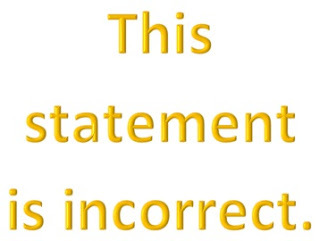What is a paradox? It's paradoxical
 Is the definition of a paradox paradoxical? Before we get into a philosophical spiral, this thought was inspired by a complaint I received when I published a review of a book about the Fermi paradox. Mark Hogarth remarked 'They'll call anything a paradox these days.' When I pointed out the name Fermi paradox dates back to the 50s, he responded 'Yes, I know, but you gotta agree that the word 'paradox' is rarely used properly... here it's just a puzzle, like the twin 'paradox'. Now Russell's paradox - that IS a paradox.'
Is the definition of a paradox paradoxical? Before we get into a philosophical spiral, this thought was inspired by a complaint I received when I published a review of a book about the Fermi paradox. Mark Hogarth remarked 'They'll call anything a paradox these days.' When I pointed out the name Fermi paradox dates back to the 50s, he responded 'Yes, I know, but you gotta agree that the word 'paradox' is rarely used properly... here it's just a puzzle, like the twin 'paradox'. Now Russell's paradox - that IS a paradox.'So was Mark right? Have many of us (me included) been using the term incorrectly? So you don't have to, I delved into the trusty source of all things wordilicious*, the Oxford English Dictionary. And got quite a surprise.
Apart from an obsolete usage, the dictionary's first definition is the one that I use - a statement that appears to contradict itself or be ridiculous, but which turns out to be well founded or true. Rather confusingly, the second definition is an almost opposite version which I know some people use, making a paradox a not-so-obvious fallacy. And the third definition is the logician's version, which makes a paradox an argument that appears to be sensible and based on logical principles, but which leads to a conclusion that is, as the OED coyly puts it 'against sense.' Like Russell's paradox** or the rather crude example I've used as an illustration above.
However, what is really interesting is that (apart from the obsolete meaning) my definition has the oldest citation, going back to 1569, the negative definition is almost as old, with the first example dating from 1570 - but the logician's definition has no evidence before the 20th century (in fact Bertrand Russell himself in 1903 is the first usage they know of).
So, interestingly, Mark's complaint was back to front. It's not that they'll call anything a paradox these days, but rather that logicians have taken a word with a long established meaning and (relatively) recently given it a different one. Don't you just love words?
* Sadly, 'wordilicious' isn't in the OED. But it ought to be.
** Very crudely, Russell's paradox, which requires some basic set theory goes something like this. Imagine we've got the set of all sets that are members of themselves (lets call it the SELF set). So, for instance, the set 'dogs' is not in the SELF set, as the set 'dogs' is not a dog. But the set 'things that aren't dog's is in the SELF set, because it isn't a dog.
The paradox arises when we consider the set of things that aren't in the SELF set. Is that set in the SELF set? If it is in the SELF set, then it isn't in the SELF set - which doesn't make sense. But if it isn't in the SELF set, then it's not a member of itself, so it is in the SELF set - which also doesn't make sense. But it does make your head spin.
Published on February 11, 2016 01:28
No comments have been added yet.



